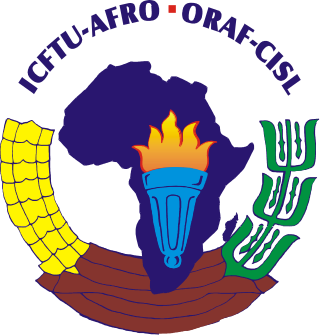
The International Confederation of Free Trade Unions (ICFTU) was an international trade union. It came into being on 7 December 1949 following a split within the World Federation of Trade Unions (WFTU), and was dissolved on 31 October 2006 when it merged with the World Confederation of Labour (WCL) to form the International Trade Union Confederation (ITUC).
Global Unions or Council of Global Unions is a website, which is jointly owned and managed by the International Trade Union Confederation (ITUC), the Trade Union Advisory Committee to the OECD, and ten global union federations (GUFs).

The World Confederation of Labour (WCL) was an international labour organization founded in 1920 and based in Europe. Fascist governments of the 1930s repressed the federation and imprisoned many of its leaders, limiting operations until the end of World War II. In 2006 it became part of the International Trade Union Confederation (ITUC), ending its existence as an independent organization.
The ITUC Regional Organisation for Asia and Pacific is a regional organisation of the International Trade Union Confederation representing trade unions from countries in Asia and Oceania. It has 40 affiliated organisations in 28 countries, claiming a membership of 30 million people.

The Trade Union Confederation of the Americas (TUCA-CSA) is the regional organization of the International Trade Union Confederation for the Americas.
The Organisation of African Trade Union Unity (OATUU) is an independent regional union federation aimed at unifying trade union centres in Africa. This organisation was founded in April, 1973 as a successor to two previously competing labour union organisations in Africa: the All-African Trade Union Federation (AATUF) and the African Trade Union Confederation (ATUC). The process to unify a Pan-African labour union organisation also involved international labour organisations as decision-making stakeholders like the International Confederation of Free Trade Unions (ICFTU) and the World Federation of Trade Unions (WFTU). Finally, also with the help of the Organisation of African Unity (OAU), the AATUF and the ATUC merged to form the OATUU. The driving factors for this unification and the creation of the OATUU was to advance Pan-Africanism, economic justice, and social justice throughout African workplaces.

The Latin American Confederation of Workers, was the World Confederation of Labour's (WCL) regional organization for Latin America and the Caribbean. The WCL merged with the International Confederation of Free Trade Unions in 2006, and in 2008, CLAT merged with the ICFTU Inter American Regional Organisation of Workers to form the Trade Union Confederation of the Americas.
The Building and Wood Workers' International (BWI) is the global union federation of democratic and free trade unions in the building, building materials, wood, forestry and allied industries.

The International Trade Union Confederation (ITUC) is the world's largest trade union federation.
Trade unions in Benin operate in relative freedom, with approximately 75% of the formal sector being unionized. There are, however, concerns expressed by the International Labour Organization (ILO) and the International Trade Union Confederation (ITUC) about the discrepancies between the government's Labour Code and the labour practices outlined by ILO Conventions 87 and 98 - specifically the right of unions to form without government approval, the right of seafarers to organize or strike, and restrictions on strikes.

The ICFTU African Regional Organisation (AFRO) was a regional organisation of the International Confederation of Free Trade Unions (ICFTU), representing trade unions from countries in Africa.

The ICFTU Asia and Pacific Regional Organisation (APRO) was a regional organisation of the International Confederation of Free Trade Unions (ICFTU), representing trade unions from countries in Asia and Oceania.

The ICFTU Inter American Regional Organisation of Workers was the regional organization of the International Confederation of Free Trade Unions (ICFTU) for the Americas.

The Ghana Trades Union Congress is a national centre that unites various workers' organizations in Ghana. The organization was established in 1945.
Amos N. Gray was a Liberian trade unionist. Born in Pull River, Maryland County, Gray attended primary school in Pull River and secondary school in Harper. He attended college in Monrovia, studying social studies for two years and law for one year. During his college years he worked part-time at the Freeport of Monrovia. Working at the port in 1960, he joined the Maritime and Dock Workers Union. After his college years he worked at the Maritime and Dock Workers Union office in Monrovia.
Heribert Maier was an Austrian trade union leader.
José Olivio Miranda Oliveira, often known as Zé Olívio, was a Brazilian trade unionist.
The Brotherhood of Asian Trade Unions (BATU) was a federation bringing together trade unionists in Asia.
Mody Guiro is a Mali-born Senegalese trade union leader.









